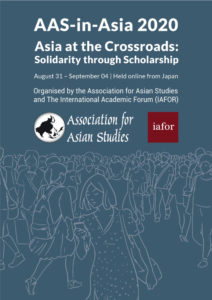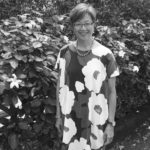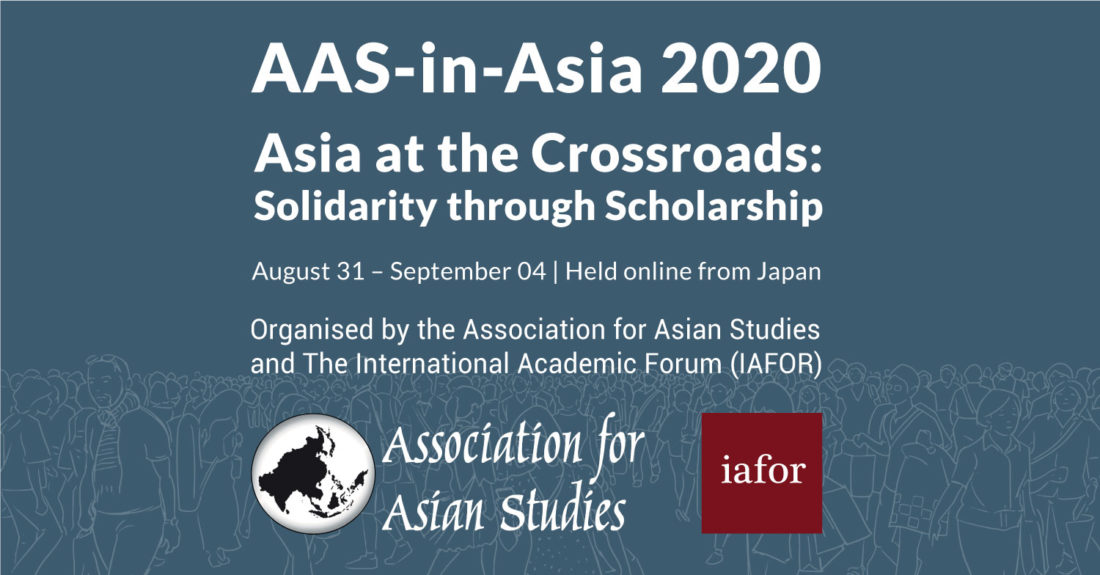Christine R. Yano, AAS President, Professor of Anthropology, University of Hawaii, USA (09/03/20)
 The 2020 meeting of AAS-in-Asia wrapped up in splendid fashion with a splashy media presentation and warm farewells. Many thanks to Joe Haldane and the IAFOR staff for stepping in and making the meeting possible with their can-do attitude and energy. Over 900 attendees I am sure agree that it was an adventure peering into and experiencing the future. Granted, there were some technological glitches, not the least among academics, most of whom had not done this before. But we’re learning. My overall take-away was excitement over the possibilities of this future-in-the-present virtual meeting. Make no doubt about it, this is not the same as meeting face-to-face, and we all rue the loss of being able to socialize and reconnect that is such a valuable part of conferences. But there are valuable take-aways that we should focus upon, such as putting together panels without regard for physical distance, and doing so with minimal environmental impact.
The 2020 meeting of AAS-in-Asia wrapped up in splendid fashion with a splashy media presentation and warm farewells. Many thanks to Joe Haldane and the IAFOR staff for stepping in and making the meeting possible with their can-do attitude and energy. Over 900 attendees I am sure agree that it was an adventure peering into and experiencing the future. Granted, there were some technological glitches, not the least among academics, most of whom had not done this before. But we’re learning. My overall take-away was excitement over the possibilities of this future-in-the-present virtual meeting. Make no doubt about it, this is not the same as meeting face-to-face, and we all rue the loss of being able to socialize and reconnect that is such a valuable part of conferences. But there are valuable take-aways that we should focus upon, such as putting together panels without regard for physical distance, and doing so with minimal environmental impact.
The wrap-up of the conference, and for me its intellectual highlight, was the closing panel, “New Threats to Academic Freedom,” organized by Krisna Uk (AAS) and Dimitar Gueorguiev (Syracuse University), with speakers Jeff Kingston (Temple University in Japan), Zaharom Nain (University of Nottingham in Malaysia), Dede Oetomo (independent scholar, Indonesia), and Kimkong Heng (from Cambodia; PhD candidate at University of Queensland, Australia). With about seventy attendees, I found the diversity of experiences both moving and absolutely critical to the message. The panel reminded me sharply of some of the important and engaged work that can be done in the name of conferences – that is, to create a campfire of values around which we gather. Coming together amplifies those values, etches them ever more deeply through their repetition, creates “solidarity through scholarship” (the theme of the AAS-in-Asia conference).
As each panelist described the situation in their own country, it reminded me of the ways in which we hold academic freedoms dear, as well as the costs to individuals and to institutions in doing so. Censorship—overt and covert, imposed from above, incorporated internally—looms large to silence individuals who espouse “inconvenient” topics and still their actions. The panelists presented a litany of very real threats that form an arsenal of academic silencing; these include instances of bodily harm, unexplained “disappearances,” surveillance, documents edited for political alignment, erasures from official history, denial of funding of particular scholars and projects. The benefit of the virtual format is that I could download some of the comments from the chatroom. I include some here with editing to remove people’s identifiers:
I feel that I have more freedom in presenting my book abroad than within our own country. I feel that we have no freedom to express ourselves in the inter-faith discussion especially when we talk about religious intolerance of the majority religious group in our country, Indonesia.
Great panel on a very timely topic, which I hope AAS will continue covering. . . . Let's talk more about potential solutions & institutional allies that can help improve the current situation. So my question is: can international donors/ foundations--who fund research in countries with repressive regimes--become more aware and take some more active role to protect researchers? What about local or international media--who could expose abuses? What about local legislators--who could update laws that constrain freedom of expression?
I'm just wondering about the strategies used to circumvent the silencing of critics, perhaps the role of satire and metaphor in these various contexts?
The panelists provided some suggestions for reform and resistance, as quoted above, in some instances changing the system from within, creating strategies for intervention -- in various ways living or talking through the balancing act of academic freedom in their particular home countries. This era of pandemic may provide its own unique challenges and opportunities for resistance. All of this comes at no small cost. And I thank the panelists and audience members for stepping up and sharing their experiences in this public forum. I also fully acknowledge those scholars who wanted to be a part of the panel, but could not, for reasons directly shaped by censorship. (One of the issues with a virtual conference for those scholars who live under particular threat is the broader access to their words, especially with a broad span of ears listening.)
We in the United States do not typically face some of the more extreme forms of academic suppression detailed by the panelists, and for that I am extremely thankful. But we may live in our own illusion of academic freedom. We may steer students toward projects that are more likely to gain funding. We may steer ourselves away from controversy in the name of wanting to maintain access to research sites. Junior scholars may find it difficult to take on controversy as readily as might fully-tenured professors. The hierarchies of the profession shape our own experiences of academic freedom globally and affect our willingness to take on risk.
Our campfire of values blazes ever more brightly as we live challenged by the political conditions in our midst. These political conditions go well beyond national boundaries to constitute global threats. The censorship suffered by one scholar threatens the academic freedom of us all. Listening to the repressive conditions faced by some of our Asian brothers and sisters populating academic regimes elsewhere serves as a cautionary to hold these values close and actionable. In short, this is a campfire whose embers need constant and active stoking in the name of responsible engagement.
The campfire challenges us as it burns. It emblazons the message of AAS-in-Asia 2020, “Asia at the Crossroads: Solidarity through Scholarship.”
 Christine R. Yano
Christine R. Yano
AAS President
Professor of Anthropology, University of Hawaii, USA


